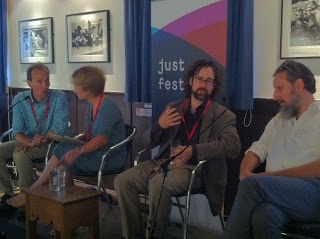THE 'Faith in the Media' conversation at St John's Church in Edinburgh this evening began with a reminder of former Downing Street spin-doctor Alasdair Campebell's famous 'we don't do God' dictum.
The speakers engaging this and other issues are Professor Jolyon Mitchell (University of Edinburgh, Centre for theology and public issues, a former journalist himself), Ephraim Borowski (Scottish Council of Jewish Communities), and Michael Brady Munnik (Alwaleed Centre, co sponsors of the event).
The chair is Seonag Mackinnon (an experienced journalist and head of media relations for the Church of Scotland).
So is religion ignored? Many would argue that it has a protected space - for example on BBC Radio 4's Thought for the Day feature in peeking listening time, noted Ephraim Borowski, who broadcasts in this 'Today' programme slot.
"Personally, I'd prefer it to be a discussion, a live conversation... Instead, we are in a bubble," he added.
In other respects, said Professor Mitchell, a former BBC producer, religion has come, if not centre stage, at least as an important feature of reporting and comment in a changing world.
"On the one hand someone in power says, 'we don't go there, it doesn't matter', but on the other hand there are other forces and developments that make it important," added PhD researcher Michael Brady Munnik, referencing the contested thesis of secularisation on the one hand and the change in the demography of belief through migration in the west and elsewhere.
Professor Mitchell said that misunderstandings and gaps can arise because of a lack of 'religious literacy' in some areas. Media organisations have put more effort into training in this area, with beneficial results.
Munnick referenced a newly elected PM who would not talk to the press gallery. Sometimes there is a sense of hesitancy in political as well as religious circles. On the other hand, creationism and the religious right, for example, have been fed by publicity.
Religion is a matter of conflicting ideologies and contested terms coming out of their different use, Ephraim Borowski pointed out. 'Tea party' style inter-faith activity doesn't reach sufficiently to embrace or probe these deep differences.
"The rest of the world is viewing through your eyes, to know what is going on, and what is going on is not just happening on the streets," he said.
When the audience joined in, there were some different views about things like the coverage of the election of the Pope and the sex abuse issues around former Cardinal Keith O'Brien.
Neutrality is very difficult when understandings of how to approach and interpret a story involving religion, said Ephraim Borowski.
We must neither treat all religions and denominations as 'the same', nor journalists and media workers, said the Moderator of the General Assembly of the Church of Scotland, the Rt Revered Lorna Hood, who was a participant in the discussion.
Seonag Mackinnon pointed out that terms like 'baptism' may no longer be widely understood in society at large, and asked whether reporters should be let off the hook for lack of knowledge, or encouraged to deepen it, or a bit of both.
The need to recognise different strands of Islam, especially when the fraught issue of terrorism is thrown at them, naturally came into the conversation.
Though it is easy to look at failings, the efforts of media organisations to fill the gaps was recognised.
"We are in the good news business," said the rector of St John's Church (the venue for tonight's conversation). "By and large, the media are not", he added. So the issue is to how to bridge the tendencies to approach things from quite different stances.
One large challenge to media presentation is the need to distinguish between 'all', 'most', 'many', 'some' and 'a few', stressed Ephraim Borowski - adding, "I have a confession, I used to be a philosopher!"
There was also mention of the changing relationship between 'production' and 'consumption', with social media, blogs, twitter and more blurring the edges of who is in or outside 'the media' -- which in any case, Jolyon Mitchell, noted "is not one single animal - there's television, radio, print and papers of different kinds, the internet, and so."
Equally, there are journalists of religion, some of whom may be 'religious journalists' and some of whom may not.
Then there is the need for media training and awareness among faith communities and leaders.
A major question is outputting very complex issues in accessible terms, in a culture where soundbite and summary is required (not just imposed) and when 'media packages' are, whether we like it or not, products that have to be telescoped and transmitted.
Among the commendations as the discussion drew to a close was that churches and other faith communities should be encouraged to embrace the task of transmitting different perspectives and news much more actively, and should look at the better use of their own media resources.
This is a developing live blog.


No comments:
Post a Comment